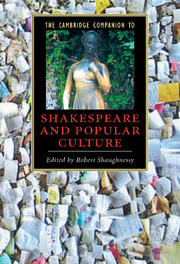Book contents
- Frontmatter
- Introduction
- 1 From popular entertainment to literature
- 2 Shakespeare abbreviated
- 3 Shakespearean stars: stagings of desire
- 4 Shakespeare illustrated
- 5 Shakespeare: myth and biographical fiction
- 6 Narration and staging in Hamlet and its afternovels
- 7 Shakespeare serialized: An Age of Kings
- 8 Musical Shakespeares: attending to Ophelia, Juliet, and Desdemona
- 9 Shakespeare overheard: performances, adaptations, and citations on radio
- 10 Shakespeare on the tourist trail
- 11 Performing Shakespeare in digital culture
- 12 Shakespeare’s popular face: from the playbill to the poster
- Further reading
- Index
- Series List
9 - Shakespeare overheard: performances, adaptations, and citations on radio
Published online by Cambridge University Press: 28 November 2008
- Frontmatter
- Introduction
- 1 From popular entertainment to literature
- 2 Shakespeare abbreviated
- 3 Shakespearean stars: stagings of desire
- 4 Shakespeare illustrated
- 5 Shakespeare: myth and biographical fiction
- 6 Narration and staging in Hamlet and its afternovels
- 7 Shakespeare serialized: An Age of Kings
- 8 Musical Shakespeares: attending to Ophelia, Juliet, and Desdemona
- 9 Shakespeare overheard: performances, adaptations, and citations on radio
- 10 Shakespeare on the tourist trail
- 11 Performing Shakespeare in digital culture
- 12 Shakespeare’s popular face: from the playbill to the poster
- Further reading
- Index
- Series List
Summary
We now come to the sensitive issue of Shakespeare on radio. And I'm afraid the less said about this topic the better in my opinion. In other words, although many have tried to make Shakespeare work on radio, it doesn't . . . In short, audiences throughout the world hate Shakespeare on the radio. And – to be honest – who's to blame them?
Audio Shakespeare in its broadest sense includes all of the ways in which versions of Shakespeare's works are transmitted and disseminated in sound only formats, whether these take the form of radio dramatizations, recordings for LPs, audio cassettes, CDs, or digital downloads for DAB radio, computers, or MP3 players. As such it is the mode of performance which is most ubiquitous and the most fully integrated into the cultures of everyday life, potentially capable of being heard anywhere, anytime. In this essay I have chosen to concentrate solely on broadcast Shakespeare; primarily the derivatives, parodies, and citations which have been part of radio from the beginning. As a radio reviewer once complained, “there are times when Shakespeare seems to get everywhere, like ants, or mice; it would be nice to be able to call in some kind of pest control service, Bardokil or Swannicide, to eliminate unwanted Shakespearean references from your life.” It may well be the case, though accurate statistics would be impossible to gather, that radio has originated and disseminated more allusions and references to Shakespeare than any other form of mass media. And yet historically it has also been one of the most unacknowledged and often ephemeral forms of Shakespearean remediation, and, partly for this reason, the one which has received least critical attention. In this sense Shakespeare has more frequently been “under” than “over” heard.
- Type
- Chapter
- Information
- The Cambridge Companion to Shakespeare and Popular Culture , pp. 175 - 198Publisher: Cambridge University PressPrint publication year: 2007
- 3
- Cited by



